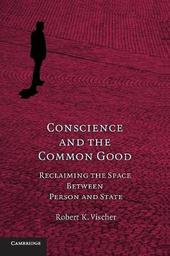
|
Conscience and the Common Good: Reclaiming the Space Between Person and State
Paperback / softback
Main Details
| Title |
Conscience and the Common Good: Reclaiming the Space Between Person and State
|
| Authors and Contributors |
By (author) Robert K. Vischer
|
| Physical Properties |
| Format:Paperback / softback | | Pages:326 | | Dimensions(mm): Height 229,Width 150 |
|
| Category/Genre | Ethics and moral philosophy |
|---|
| ISBN/Barcode |
9780521130707
|
| Classifications | Dewey:323.4420973 |
|---|
| Audience | | Professional & Vocational | |
|---|
| Illustrations |
Worked examples or Exercises
|
|
Publishing Details |
| Publisher |
Cambridge University Press
|
| Imprint |
Cambridge University Press
|
| Publication Date |
14 December 2009 |
| Publication Country |
United Kingdom
|
Description
Our society's longstanding commitment to the liberty of conscience has become strained by our increasingly muddled understanding of what conscience is and why we value it. Too often we equate conscience with individual autonomy, and so we reflexively favor the individual in any contest against group authority, losing sight of the fact that a vibrant liberty of conscience requires a vibrant marketplace of morally distinct groups. Defending individual autonomy is not the same as defending the liberty of conscience because, although conscience is inescapably personal, it is also inescapably relational. Conscience is formed, articulated, and lived out through relationships, and its viability depends on the law's willingness to protect the associations and venues through which individual consciences can flourish: these are the myriad institutions that make up the space between the person and the state. Conscience and the Common Good reframes the debate about conscience by bringing its relational dimension into focus.
Author Biography
Robert K. Vischer is associate professor at University of St. Thomas School of Law in Minneapolis. Professor Vischer's scholarship explores the intersection of law, religion, and public policy, with a particular focus on the religious and moral dimensions of professional identity. His writings have appeared in a number of scholarly journals, magazines, and blogs.
Reviews"There is no freedom more essential to the flourishing of a truly liberal democracy than the freedom to live one's life in accord with the yield of one conscience-that is, with one's religious and/or moral convictions and commitments. And yet, the nature and implications of that freedom-which we may call freedom (or liberty) of conscience, and which of course cannot be absolute-are not well understood. Conscience and the Common Good is an excellent, engaging discussion of how to understand freedom of conscience and of how to protect it in a contemporary democracy, such as the United States, whose citizens disagree deeply among themselves about such morally fraught matters as abortion and same-sex marriage. Robert Vischer's book is must reading for citizens and scholars interested in freedom of conscience." --Michael J. Perry, author of The Political Morality of Liberal Democracy "When should claims of conscience override state-imposed norms of nondiscrimination and equal access to goods and services? Robert Vischer brings a fresh and subtle perspective to these questions, arguing for a "moral marketplace" in which, whenever possible, different groups and businesses follow competing moral norms. Vischer offers a probing and sophisticated analysis of a timely problem." --Andrew Koppelman, author of A Right to Discriminate? How the Case of Boy Scouts of America v. James Dale Warped the Law of Free Association "Safeguarding the conditions of human flourishing and freedom is rarely a simple matter of fending off government intrusion or asserting one's abstract rights. As readers of this volume will better appreciate, it turns out to involve a project of tending more deliberately to the overall social ecology, with attention to the complex ways people communicate and interact in shared spaces. Vischer's erudite and skillful analysis highlights the thick interpersonal commitments situated within the myriad associations that mediate between individuals and the state. Only within this context will a healthy respect for conscience be guaranteed today." - Thomas J. Massaro, America Magazine
|